 The major theme of this story from Willa Cather is daring to be different. The protagonist and his aging uncle have the same birthday. Both have suffered major losses: the protagonist, his share of his father’s fortune, frittered away on travel and entertainment; the uncle, a young musical protégée he undoubtedly loved. They share a house, living in the past among sentimental relics and resisting cultural aspects of “modern” (1920s) America. An unexpected visitor on their mutual birthday signals that things may soon change for the better. Themes include nonconformity, cultural dissent, judgmentalism, the price of “success”, and revitalization. More…
The major theme of this story from Willa Cather is daring to be different. The protagonist and his aging uncle have the same birthday. Both have suffered major losses: the protagonist, his share of his father’s fortune, frittered away on travel and entertainment; the uncle, a young musical protégée he undoubtedly loved. They share a house, living in the past among sentimental relics and resisting cultural aspects of “modern” (1920s) America. An unexpected visitor on their mutual birthday signals that things may soon change for the better. Themes include nonconformity, cultural dissent, judgmentalism, the price of “success”, and revitalization. More…
Category Archives: Novelettes
Philomel Cottage
 This romantic story with a deadly twist is one of Agatha Christie’s lesser-known tales. Shortly after newly-weds Alix and Gerald move into secluded Philomel Cottage, Alix hears some disturbing news from the gardener. Gerald’s angry reaction when she asks him about it makes her realize how little she really knows about him. She sets out to fill in the gaps and discovers a trail of bigamy, swindling, murder, and escape form prison. Sensing danger, some quick thinking and a terrible-tasting new brand of coffee save her life. Themes include love and romance, manipulation, isolation, innocence, curiosity, fear, and the supernatural. More…
This romantic story with a deadly twist is one of Agatha Christie’s lesser-known tales. Shortly after newly-weds Alix and Gerald move into secluded Philomel Cottage, Alix hears some disturbing news from the gardener. Gerald’s angry reaction when she asks him about it makes her realize how little she really knows about him. She sets out to fill in the gaps and discovers a trail of bigamy, swindling, murder, and escape form prison. Sensing danger, some quick thinking and a terrible-tasting new brand of coffee save her life. Themes include love and romance, manipulation, isolation, innocence, curiosity, fear, and the supernatural. More…
The Diamond as Big as the Ritz
 This grim fantasy by F. Scott Fitzgerald satirises America’s mega-rich and, in a broader sense, the “American Dream” in which for some the pursuit of wealth becomes the most important goal in life. A school “friend” invites a young man to holiday at his luxurious family home deep in the Montana Mountains. The narcissistic family’s wealth comes from a secret diamond mine, which is so rich that strangers who enter their hidden valley are never allowed to leave. Themes include the potential corrupting power of great wealth, middle-class preoccupation with wealth, racism, restricted freedom (slavery, imprisonment and/or death), isolationism, escape. More…
This grim fantasy by F. Scott Fitzgerald satirises America’s mega-rich and, in a broader sense, the “American Dream” in which for some the pursuit of wealth becomes the most important goal in life. A school “friend” invites a young man to holiday at his luxurious family home deep in the Montana Mountains. The narcissistic family’s wealth comes from a secret diamond mine, which is so rich that strangers who enter their hidden valley are never allowed to leave. Themes include the potential corrupting power of great wealth, middle-class preoccupation with wealth, racism, restricted freedom (slavery, imprisonment and/or death), isolationism, escape. More…
Noise Level
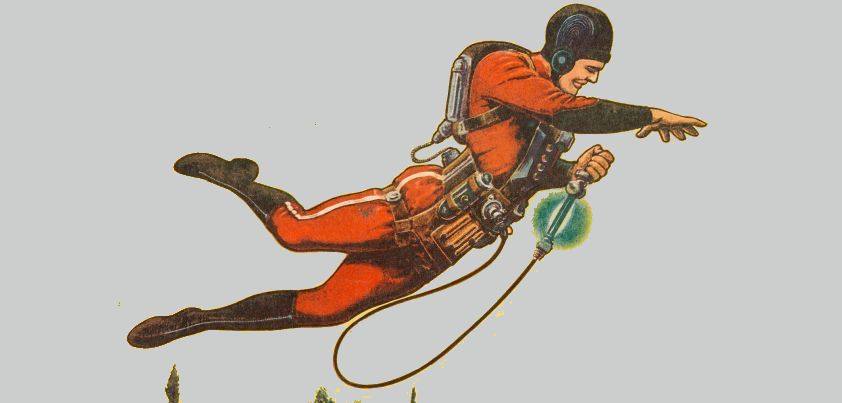 The major theme of this Science Fiction mystery by Raymond F. Jones is unlocking the hidden potential of the human mind. A government research laboratory gathers America’s leading scientists to replicate an “antigravity belt” that seemingly defies the fundamental laws of physics. The secretive young inventor died in an accident demonstrating the belt. He left no notes, and the only prototype was destroyed in the crash. To complicate matters his areas of research included not only the sciences, but also the occult with a special interest in levitation. Other themes: scientific dogmatism vs. open-mindedness, the scientific method, deception. More…
The major theme of this Science Fiction mystery by Raymond F. Jones is unlocking the hidden potential of the human mind. A government research laboratory gathers America’s leading scientists to replicate an “antigravity belt” that seemingly defies the fundamental laws of physics. The secretive young inventor died in an accident demonstrating the belt. He left no notes, and the only prototype was destroyed in the crash. To complicate matters his areas of research included not only the sciences, but also the occult with a special interest in levitation. Other themes: scientific dogmatism vs. open-mindedness, the scientific method, deception. More…
Christmas Not Just Once a Year
 This farcical comedy by Heinrich Böll can be looked at from two perspectives. The first is as a Christmas satire. After years of austere Christmases during World War II, the wife of a German businessman becomes hysterical when the tree for the traditional lavish family Christmas of 1946 is taken down. To prevent her being institutionalized, her family agree to re-celebrate Christmas Eve every day of the year. They go to ridiculous lengths to do this, destroying family unity in the process. Themes: family, tradition, mental illness, alienation, dehumanization, commercialization and loss of the spiritual meaning of Christmas, facing reality. More…
This farcical comedy by Heinrich Böll can be looked at from two perspectives. The first is as a Christmas satire. After years of austere Christmases during World War II, the wife of a German businessman becomes hysterical when the tree for the traditional lavish family Christmas of 1946 is taken down. To prevent her being institutionalized, her family agree to re-celebrate Christmas Eve every day of the year. They go to ridiculous lengths to do this, destroying family unity in the process. Themes: family, tradition, mental illness, alienation, dehumanization, commercialization and loss of the spiritual meaning of Christmas, facing reality. More…
The Birds
 This 1952 horror story by Daphne du Maurier follows a family who, along with all of Britain, come under sustained attacks by flocks of crazed birds. Seen as an analogy of the terror caused by World War Two blitz bombing and concerns about the developing Cold War, the story carries even more ominous implications for today. Consider the suggestion that climate change (shifts in the Arctic air stream) may have upset the natural order, and the death and worldwide disorder a small virus (Covid) recently caused. Themes: the vulnerability of mankind to war/natural forces, human/government complacence/ineptitiude, isolation, family, survival, self-reliance. More…
This 1952 horror story by Daphne du Maurier follows a family who, along with all of Britain, come under sustained attacks by flocks of crazed birds. Seen as an analogy of the terror caused by World War Two blitz bombing and concerns about the developing Cold War, the story carries even more ominous implications for today. Consider the suggestion that climate change (shifts in the Arctic air stream) may have upset the natural order, and the death and worldwide disorder a small virus (Covid) recently caused. Themes: the vulnerability of mankind to war/natural forces, human/government complacence/ineptitiude, isolation, family, survival, self-reliance. More…
Ringing the Changes
 This story by Robert Aickman describes the frightening first night of a delayed honeymoon. The bride, much younger than the groom, wanted to spend their time in a remote coastal village neither had visited before. The moment they arrive, a church bell starts ringing continuously. It is out of tourist season, the streets are empty, the hotel staff act strangely, and there is a sickening, rotten smell in the air. Later, the bells of every church in the village begin ringing with urgency, heralding a macabre annual festival involving the walking dead. Themes: marriage, insecurity, isolation, class, fear, the supernatural. More…
This story by Robert Aickman describes the frightening first night of a delayed honeymoon. The bride, much younger than the groom, wanted to spend their time in a remote coastal village neither had visited before. The moment they arrive, a church bell starts ringing continuously. It is out of tourist season, the streets are empty, the hotel staff act strangely, and there is a sickening, rotten smell in the air. Later, the bells of every church in the village begin ringing with urgency, heralding a macabre annual festival involving the walking dead. Themes: marriage, insecurity, isolation, class, fear, the supernatural. More…
The Ghost of Michael Jackson
 This story by Ngugi wa Thiong’o satirizes attempts to instill Western & Eastern religious values in post-colonial Kenya. In the process, it lampoons some widely documented scandals of the modern church and the growth of contemporary megachurches with fallen celebrity pastors. A charismatic parish priest flees when a psychic boy reveals some of his vices. His loving flock are so upset by the disappearance that they overlook the boy’s revelations and are overjoyed when the priest mysteriously reappears in the form of a resurrected Michael Jackson. Themes: childhood innocence, the supernatural, superstition, culture clash, religious rivalry, zealotry, hypocrisy. More…
This story by Ngugi wa Thiong’o satirizes attempts to instill Western & Eastern religious values in post-colonial Kenya. In the process, it lampoons some widely documented scandals of the modern church and the growth of contemporary megachurches with fallen celebrity pastors. A charismatic parish priest flees when a psychic boy reveals some of his vices. His loving flock are so upset by the disappearance that they overlook the boy’s revelations and are overjoyed when the priest mysteriously reappears in the form of a resurrected Michael Jackson. Themes: childhood innocence, the supernatural, superstition, culture clash, religious rivalry, zealotry, hypocrisy. More…
Window
 This award-winning story is a wonderful example of Deborah Eisenberg’s unusual writing style. Starting and ending at the same place, the back-story is provided in disjointed fragments that generate a sense of increasing menace as the full picture emerges. A directionless, insecure eighteen-year-old leaves an unfulfilling waitress job to live in an idyllic, off-the-grid cabin with a seemingly perfect man and his infant son. She flees several months later after a brutal beating, leaving readers to ponder the reasons for and wisdom of her abduction of his child. Themes: family, friendship, loneliness, isolation, fear, quest for fulfillment. More…
This award-winning story is a wonderful example of Deborah Eisenberg’s unusual writing style. Starting and ending at the same place, the back-story is provided in disjointed fragments that generate a sense of increasing menace as the full picture emerges. A directionless, insecure eighteen-year-old leaves an unfulfilling waitress job to live in an idyllic, off-the-grid cabin with a seemingly perfect man and his infant son. She flees several months later after a brutal beating, leaving readers to ponder the reasons for and wisdom of her abduction of his child. Themes: family, friendship, loneliness, isolation, fear, quest for fulfillment. More…
The Fall of Edward Barnard
 Although ostensibly themed around a clash of cultures (East vs. West), this story from W. Somerset Maugham is also about alternative lifestyles (materialistic vs. minimalist). Through extensive use of irony, the story contrasts the lust for money, power and status of American industrialists and socialites with the Tahitian way of living in harmony with nature. In presenting the contrast, the story implies that although the environment a person grows up in shapes their values and beliefs, a change of surroundings can drastically alter them. Other themes: friendship, loyalty, romance, pride, racism. More…
Although ostensibly themed around a clash of cultures (East vs. West), this story from W. Somerset Maugham is also about alternative lifestyles (materialistic vs. minimalist). Through extensive use of irony, the story contrasts the lust for money, power and status of American industrialists and socialites with the Tahitian way of living in harmony with nature. In presenting the contrast, the story implies that although the environment a person grows up in shapes their values and beliefs, a change of surroundings can drastically alter them. Other themes: friendship, loyalty, romance, pride, racism. More…
The Short Happy Life of Francis Macomber
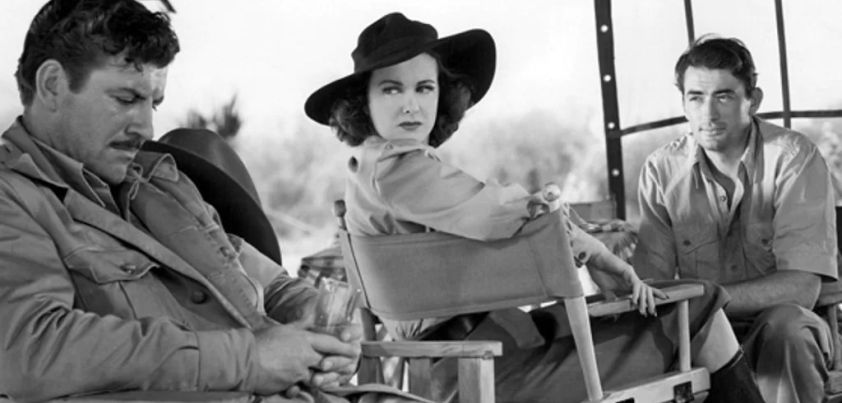 Author Ernest Hemingway goes to great lengths to set up an ambiguous ending to this story about a rich American couple’s fateful big game hunting safari in Africa. No longer (and perhaps never) in love, the couple barely tolerate each other. She can’t afford to divorce him, and he is unlikely to find a more attractive trophy wife. Readers are left to consider whether Francis’s death was murder or an unfortunate accident. What do you think? The major themes are clearly courage and masculinity. Other themes: fear; shame; violence; marriage breakdown; beauty & aging; adultery; misogyny & female stereotyping. More…
Author Ernest Hemingway goes to great lengths to set up an ambiguous ending to this story about a rich American couple’s fateful big game hunting safari in Africa. No longer (and perhaps never) in love, the couple barely tolerate each other. She can’t afford to divorce him, and he is unlikely to find a more attractive trophy wife. Readers are left to consider whether Francis’s death was murder or an unfortunate accident. What do you think? The major themes are clearly courage and masculinity. Other themes: fear; shame; violence; marriage breakdown; beauty & aging; adultery; misogyny & female stereotyping. More…
The Dream of a Ridiculous Man
 Fyodor Dostoevsky’s thought-provoking story of a man who thinks he and his life are so ridiculous as to not be worth living packs a powerful message. Having decided to commit suicide, his life is turned around by a chance encounter with a young girl asking for help on the street, and a dreamed journey to a utopian world. He learns that meaning and happiness come through suffering and love (kindness), and that indifference (lack of concern for others) can destroy them. Themes: nihilism, despair, suffering, compassion, meaning in life. More…
Fyodor Dostoevsky’s thought-provoking story of a man who thinks he and his life are so ridiculous as to not be worth living packs a powerful message. Having decided to commit suicide, his life is turned around by a chance encounter with a young girl asking for help on the street, and a dreamed journey to a utopian world. He learns that meaning and happiness come through suffering and love (kindness), and that indifference (lack of concern for others) can destroy them. Themes: nihilism, despair, suffering, compassion, meaning in life. More…
Disorder and Early Sorrow
 The charm of this story by Thomas Mann lies in its relative uneventfulness… no crime, violence, madness or broken hearts! Set in the 1920s, it follows a day in the life of a close, middle-class German family. The major theme is resilience: the struggle of the German people to recover from the social disruption and deprivations of World War I and cope with emerging hyperinflation. Secondary themes are identity, the relationship between history and the present, and the emergence of a more independent youth culture embracing new styles in music, dance, fashion and the arts. More…
The charm of this story by Thomas Mann lies in its relative uneventfulness… no crime, violence, madness or broken hearts! Set in the 1920s, it follows a day in the life of a close, middle-class German family. The major theme is resilience: the struggle of the German people to recover from the social disruption and deprivations of World War I and cope with emerging hyperinflation. Secondary themes are identity, the relationship between history and the present, and the emergence of a more independent youth culture embracing new styles in music, dance, fashion and the arts. More…
You’re Ugly, Too
 Lorrie Moore’s protagonist Zoë is a small-town college professor. She is a free-spirited, “almost pretty”, emotionally troubled woman whose efforts to forge relationships without being a “Heidi” have achieved the opposite. Her witty, cynical one-liners have alienated colleagues, students and suitors alike. Central themes are loneliness, the expectations of men, and the role of sex in relationships. An offensive, misogynistic “big city” blind date confirms her misgivings about marriage; a medical scare and consequent thoughts of death bring into focus what she sees as the futility of her life. Other themes: isolation, alienation, appearance, gender roles, mortality, nihilism. More…
Lorrie Moore’s protagonist Zoë is a small-town college professor. She is a free-spirited, “almost pretty”, emotionally troubled woman whose efforts to forge relationships without being a “Heidi” have achieved the opposite. Her witty, cynical one-liners have alienated colleagues, students and suitors alike. Central themes are loneliness, the expectations of men, and the role of sex in relationships. An offensive, misogynistic “big city” blind date confirms her misgivings about marriage; a medical scare and consequent thoughts of death bring into focus what she sees as the futility of her life. Other themes: isolation, alienation, appearance, gender roles, mortality, nihilism. More…
The Bloody Chamber
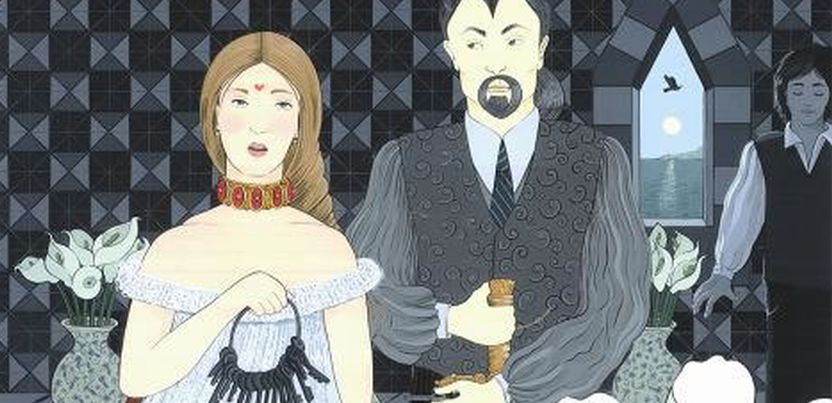 In Angela Carter’s titillating re-telling of Charles Perrault’s Bluebeard, a wealthy, three-times widowed French nobleman marries a seventeen-year-old virtuoso pianist and rushes her away to his secluded castle for a “honeymoon”. When browsing the library, she is shocked to discover his penchant for sadistic pornography. After a passionless consummation that satisfies his desire to have married a virgin, he lays a deadly trap designed to end the marriage. While he is away on business, the woman’s dark newborn curiosity springs the trap, which leads her into his bloody chamber. Themes: manipulation, sexual awakening, depravity, loneliness, curiosity, violence, death. More…
In Angela Carter’s titillating re-telling of Charles Perrault’s Bluebeard, a wealthy, three-times widowed French nobleman marries a seventeen-year-old virtuoso pianist and rushes her away to his secluded castle for a “honeymoon”. When browsing the library, she is shocked to discover his penchant for sadistic pornography. After a passionless consummation that satisfies his desire to have married a virgin, he lays a deadly trap designed to end the marriage. While he is away on business, the woman’s dark newborn curiosity springs the trap, which leads her into his bloody chamber. Themes: manipulation, sexual awakening, depravity, loneliness, curiosity, violence, death. More…
To Room Nineteen
 On the surface, Doris Lessing’s protagonist had a perfect life. “Happily” married, financially secure, big house, healthy well-adjusted children, home help; what more could a woman want? The story is a product of its time (the early 1960s). Susan’s anguish about losing her independence and lack of fulfillment in life leads to depression, mental decline, and temporary escape from her demons in Room 19 of a seedy hotel. Too afraid of being ridiculed to confide in her husband and ask for help, she sees only one way out. Themes: loss of autonomy/identity, unsatisfying marriage, depression, communication breakdown, isolation, suicide. More…
On the surface, Doris Lessing’s protagonist had a perfect life. “Happily” married, financially secure, big house, healthy well-adjusted children, home help; what more could a woman want? The story is a product of its time (the early 1960s). Susan’s anguish about losing her independence and lack of fulfillment in life leads to depression, mental decline, and temporary escape from her demons in Room 19 of a seedy hotel. Too afraid of being ridiculed to confide in her husband and ask for help, she sees only one way out. Themes: loss of autonomy/identity, unsatisfying marriage, depression, communication breakdown, isolation, suicide. More…
Letter From an Unknown Woman
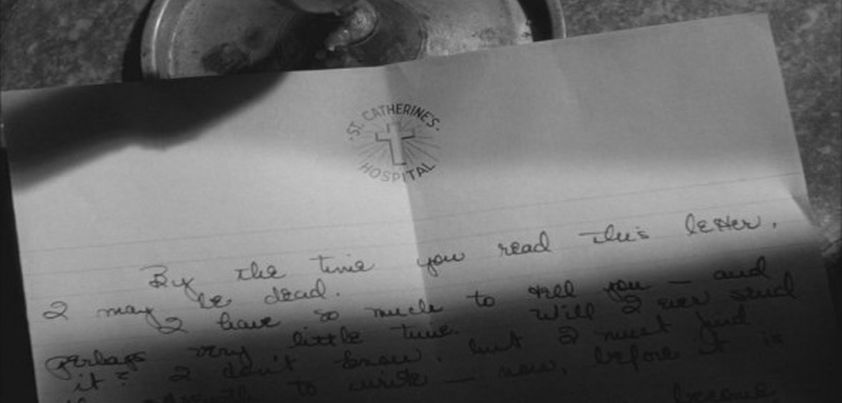 In this moving story by Stefan Zweig, a playboy writer receives a letter from a lovesick, dying woman. She has worshipped him all her life, they have had two brief dalliances, and she has borne his son. Yet he has no idea who she is! Until their son was born, he was the sole focus of her life; for him, she didn’t exist. Readers are left with a question. If she loved him so much, why send a letter that may haunt him for the rest of his days? Themes: philandering, obsessive love, sacrifice, passion, suffering, confession, death. More…
In this moving story by Stefan Zweig, a playboy writer receives a letter from a lovesick, dying woman. She has worshipped him all her life, they have had two brief dalliances, and she has borne his son. Yet he has no idea who she is! Until their son was born, he was the sole focus of her life; for him, she didn’t exist. Readers are left with a question. If she loved him so much, why send a letter that may haunt him for the rest of his days? Themes: philandering, obsessive love, sacrifice, passion, suffering, confession, death. More…
Youth
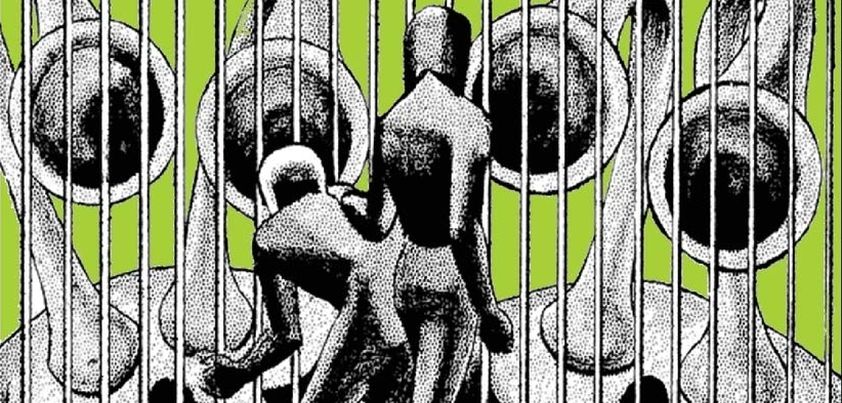 As is often the case with Isaac Asimov’s longer science fiction stories, Youth includes some profound “earthly” themes. Written in the early years of the Cold War, the first is the danger that atomic war poses to civilization. The second, which is strongly reinforced by the twist ending, is not to judge sentient beings (people) by their looks, no matter how strange they appear. A final theme, as reflected in the title and the Astronomer’s exasperated final exclamation (Youth!) is the naïve innocence of the young, and the responsibility that we as adults hold for their future. More…
As is often the case with Isaac Asimov’s longer science fiction stories, Youth includes some profound “earthly” themes. Written in the early years of the Cold War, the first is the danger that atomic war poses to civilization. The second, which is strongly reinforced by the twist ending, is not to judge sentient beings (people) by their looks, no matter how strange they appear. A final theme, as reflected in the title and the Astronomer’s exasperated final exclamation (Youth!) is the naïve innocence of the young, and the responsibility that we as adults hold for their future. More…
The Hell Screen
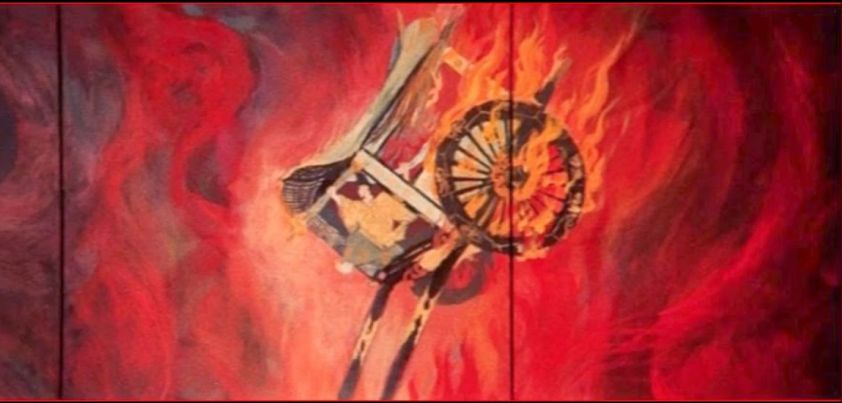 In Ryūnosuke Akutagawa‘s re-working of this 13th century Japanese tale, a cold-hearted, conceited artist considered to be “the greatest in the land” insists upon personally experiencing the scenes he creates. When commissioned to paint a folding screen with a scene from Hell, he is able to complete all but the central image of a beautiful woman burning alive in a nobleman’s carriage. He asks for help from his Feudal Lord, who agrees to stage the event for him. As the artist watches, his emotions range from horror to ecstasy. Themes: hubris, inhumanity, obsession, inspiration in art, innocence, perception of truth. More…
In Ryūnosuke Akutagawa‘s re-working of this 13th century Japanese tale, a cold-hearted, conceited artist considered to be “the greatest in the land” insists upon personally experiencing the scenes he creates. When commissioned to paint a folding screen with a scene from Hell, he is able to complete all but the central image of a beautiful woman burning alive in a nobleman’s carriage. He asks for help from his Feudal Lord, who agrees to stage the event for him. As the artist watches, his emotions range from horror to ecstasy. Themes: hubris, inhumanity, obsession, inspiration in art, innocence, perception of truth. More…
A Silver Dish
 The central theme of this thought-provoking story from Saul Bellow is protagonist Woody’s relationships with his extended family. Although much of his week is spent fulfilling the sense of duty he feels towards them, he also makes time for carnal and other pleasures. A turning point in Woody’s youth was his con-man father (Morris)’s theft of a silver dish. Despite their differences, father and son remained close and Morris’s death affects Woody greatly. In the heart-warming denouement, he proclaims his love by climbing into the dying man’s hospital bed. Other themes: life, ethnic/religious allegiances, aging, death, duty, self-indulgence, isolation.
The central theme of this thought-provoking story from Saul Bellow is protagonist Woody’s relationships with his extended family. Although much of his week is spent fulfilling the sense of duty he feels towards them, he also makes time for carnal and other pleasures. A turning point in Woody’s youth was his con-man father (Morris)’s theft of a silver dish. Despite their differences, father and son remained close and Morris’s death affects Woody greatly. In the heart-warming denouement, he proclaims his love by climbing into the dying man’s hospital bed. Other themes: life, ethnic/religious allegiances, aging, death, duty, self-indulgence, isolation.
Lord Arthur Savile’s Crime
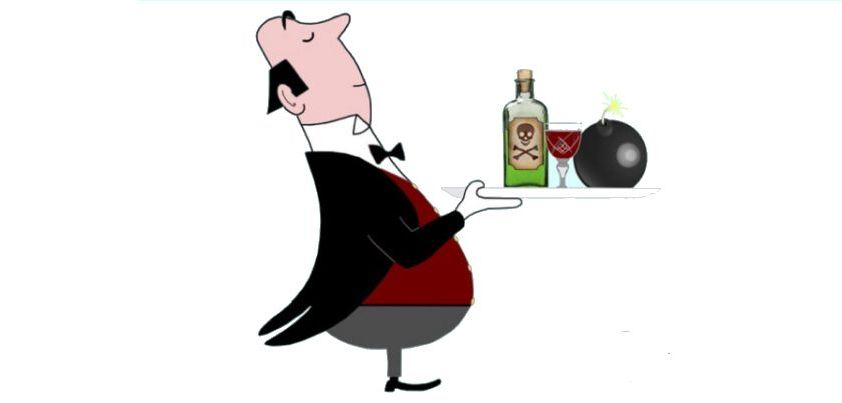 This dark comedy from Oscar Wilde involves a gullible young aristocrat who believes a palm-reader’s prediction that he will commit a murder. Out of consideration for his fiancé, he decides that he should postpone their marriage until he can get the deed out of the way. Convinced that he is merely fulfilling his destiny, the young man feels no guilt in planning and preparing for murder, or indeed remorse afterwards. When he later learns that the palm-reader was a charlatan, he still has no regrets. Themes: the shallowness and hypocrisy of the Victorian upper class, destiny, murder, morals, karma. More…
This dark comedy from Oscar Wilde involves a gullible young aristocrat who believes a palm-reader’s prediction that he will commit a murder. Out of consideration for his fiancé, he decides that he should postpone their marriage until he can get the deed out of the way. Convinced that he is merely fulfilling his destiny, the young man feels no guilt in planning and preparing for murder, or indeed remorse afterwards. When he later learns that the palm-reader was a charlatan, he still has no regrets. Themes: the shallowness and hypocrisy of the Victorian upper class, destiny, murder, morals, karma. More…
Great Day
 David Malouf’s Great Day takes place over the seventy-second birthday celebration for the patriarch of a large, close-knit Australian family. The story explores some of the differences and tensions between family members, as well as the state of mind of the patriarch. A powerful retired senior public servant with a commanding personality, he is consumed by thoughts of death. Two linked events, the destruction of a family museum and the subsequent moving words of a usually shy, tongue-tied family member bring a sense of peace to the old man and unification to the family. Themes: power, loss, connection. More…
David Malouf’s Great Day takes place over the seventy-second birthday celebration for the patriarch of a large, close-knit Australian family. The story explores some of the differences and tensions between family members, as well as the state of mind of the patriarch. A powerful retired senior public servant with a commanding personality, he is consumed by thoughts of death. Two linked events, the destruction of a family museum and the subsequent moving words of a usually shy, tongue-tied family member bring a sense of peace to the old man and unification to the family. Themes: power, loss, connection. More…
The Encyclopedia of the Dead
 The legendary Encyclopedia in this story by Danilo Kiš records minute details of the lives of all people not famous enough to have a published biography. Readers encounter two sets of themes: those related to the book, and those arising from the protagonist’s dream about her father’s entry in the book. For the book we have egalitarianism (equality in eternity), individuality (each person is a star unto himself) and singularity (nothing in the history of mankind is ever repeated). For the protagonist’s dream, which ends with a supernatural twist, we have memories, love, aging, and coming to terms with death. More…
The legendary Encyclopedia in this story by Danilo Kiš records minute details of the lives of all people not famous enough to have a published biography. Readers encounter two sets of themes: those related to the book, and those arising from the protagonist’s dream about her father’s entry in the book. For the book we have egalitarianism (equality in eternity), individuality (each person is a star unto himself) and singularity (nothing in the history of mankind is ever repeated). For the protagonist’s dream, which ends with a supernatural twist, we have memories, love, aging, and coming to terms with death. More…
The Offshore Pirate
 Several F. Scott Fitzgerald stories feature spoiled young women from wealthy families who make a sport of manipulating the men around them. Ardita, the flapper protagonist in this romantic adventure, is one of the rudest, most obnoxious of these. A highlight of the story is Fitzgerald’s powerful descriptive language. A disturbing feature for today’s readers is the use of 1920s social and racial slurs in building Curtis Carlyle’s backstory. Major themes include wealth, egotism, rebellion against authority, escapism, racism and class-consciousness. Despite the closing “illustrative” kiss, one wonders if any relationship with Ardita could have a happily ever after ending. More…
Several F. Scott Fitzgerald stories feature spoiled young women from wealthy families who make a sport of manipulating the men around them. Ardita, the flapper protagonist in this romantic adventure, is one of the rudest, most obnoxious of these. A highlight of the story is Fitzgerald’s powerful descriptive language. A disturbing feature for today’s readers is the use of 1920s social and racial slurs in building Curtis Carlyle’s backstory. Major themes include wealth, egotism, rebellion against authority, escapism, racism and class-consciousness. Despite the closing “illustrative” kiss, one wonders if any relationship with Ardita could have a happily ever after ending. More…
The Machine Stops
 This Science Fiction classic by E. M. Forster explores the role of “the machine” in the rise and fall of a future dystopian civilization. After developing the machine the population grow dependent upon it, become controlled by it, worship it, and are ultimately destroyed by it. In the process, they regress in terms of human interaction, family relationships, physical strength, critical thinking ability and free will. Only the “homeless”, who have no access to the machine, survive. The major theme is the danger of over-reliance on and losing control of technology. Other themes: environmental degradation, religious faith, freedom, rebellion. More…
This Science Fiction classic by E. M. Forster explores the role of “the machine” in the rise and fall of a future dystopian civilization. After developing the machine the population grow dependent upon it, become controlled by it, worship it, and are ultimately destroyed by it. In the process, they regress in terms of human interaction, family relationships, physical strength, critical thinking ability and free will. Only the “homeless”, who have no access to the machine, survive. The major theme is the danger of over-reliance on and losing control of technology. Other themes: environmental degradation, religious faith, freedom, rebellion. More…
Dharma
 This story from Vikram Chandra focuses on the life of career soldier Jago Antia. In a twist on the ghost story genre, most of the action occurs in a house haunted not by the ghost of a dead inhabitant, but the “lost” spirit of Jago’s youth. A question raised by the story is Which of the many meanings of the word “dharma” does the title refer to? Superficially, it reflects Jago’s distinguished career (duty). On a deeper level, it represents the self-awareness (freedom) provided by confronting his personal ghost. Themes: modern vs. traditional beliefs, duty, self-discipline, courage, the supernatural, dharma. More…
This story from Vikram Chandra focuses on the life of career soldier Jago Antia. In a twist on the ghost story genre, most of the action occurs in a house haunted not by the ghost of a dead inhabitant, but the “lost” spirit of Jago’s youth. A question raised by the story is Which of the many meanings of the word “dharma” does the title refer to? Superficially, it reflects Jago’s distinguished career (duty). On a deeper level, it represents the self-awareness (freedom) provided by confronting his personal ghost. Themes: modern vs. traditional beliefs, duty, self-discipline, courage, the supernatural, dharma. More…
Caroline’s Wedding
 In this moving story from Edwidge Danticat, the Haitian-American narrator helps bridge differences between her widowed mother, who still embraces their traditional culture, and younger Americanized sister (Caroline). The mother is uneasy about Caroline’s coming marriage to a non-Haitian. She finds all sorts of problems with the man, the courtship, and the wedding preparations. However, after her traditional magic fails to separate them, she reluctantly accepts the inevitable. Themes: family bonds (mother-daughter, sister-sister, daughter-father), cultural identity (observing and handing down cultural values, traditions and beliefs), cultural differences, the price of freedom (suffering, loss, death). More…
In this moving story from Edwidge Danticat, the Haitian-American narrator helps bridge differences between her widowed mother, who still embraces their traditional culture, and younger Americanized sister (Caroline). The mother is uneasy about Caroline’s coming marriage to a non-Haitian. She finds all sorts of problems with the man, the courtship, and the wedding preparations. However, after her traditional magic fails to separate them, she reluctantly accepts the inevitable. Themes: family bonds (mother-daughter, sister-sister, daughter-father), cultural identity (observing and handing down cultural values, traditions and beliefs), cultural differences, the price of freedom (suffering, loss, death). More…
The Dead
 The major themes in this James Joyce masterpiece are failure to change (paralysis) and, of course, death and “the dead”. Other themes include Irish Nationalism, cultural identity, tradition, privilege, pride, and self-discovery. Gabriel, a condescending Irish intellectual, has rejected his country’s entrenched “backward” culture and embraced cosmopolitan British ways. His wife’s reaction to a little-known Irish folk-song sung by her long-dead first love brings about an epiphany. Gabriel suddenly realizes the need to take more positive steps in his own life, and how the lives of the dead can have a major influence on the living. More…
The major themes in this James Joyce masterpiece are failure to change (paralysis) and, of course, death and “the dead”. Other themes include Irish Nationalism, cultural identity, tradition, privilege, pride, and self-discovery. Gabriel, a condescending Irish intellectual, has rejected his country’s entrenched “backward” culture and embraced cosmopolitan British ways. His wife’s reaction to a little-known Irish folk-song sung by her long-dead first love brings about an epiphany. Gabriel suddenly realizes the need to take more positive steps in his own life, and how the lives of the dead can have a major influence on the living. More…
Leiningen Versus the Ants
 In today’s story by Carl Stephenson, four hundred men on a Brazilian plantation fight off an army of killer ants. Its major theme is the courage and ingenuity of (European) man against the power of nature. Other themes include the “civilizing” benefits of colonialism, racism (Leiningen is portrayed as a heroic leader, the Indian “peons” primitive and fearful) and misogyny (Critical situations first become crises when oxen or women get excited.) Ironically, despite Leiningen’s boasts about his superior intelligence and faultless preparations (which fail), it is a last-minute idea, which he had previously overlooked, that saves the day. More…
In today’s story by Carl Stephenson, four hundred men on a Brazilian plantation fight off an army of killer ants. Its major theme is the courage and ingenuity of (European) man against the power of nature. Other themes include the “civilizing” benefits of colonialism, racism (Leiningen is portrayed as a heroic leader, the Indian “peons” primitive and fearful) and misogyny (Critical situations first become crises when oxen or women get excited.) Ironically, despite Leiningen’s boasts about his superior intelligence and faultless preparations (which fail), it is a last-minute idea, which he had previously overlooked, that saves the day. More…
A Shinagawa Monkey / Confessions of a Shinagawa Monkey
 Last year (2020) Haruki Murakami released Confessions of a Shinagawa Monkey, a sequel to his 2006 story, A Shinagawa Monkey. Both deal with a talking monkey who steals items showing the names of women to whom he is attracted. By concentrating on these, he absorbs aspects of the women’s identity. Although this satisfies the Monkey’s desires towards the women, it causes them to forget their names. The monkey is a symbol for all the lonely, often overlooked people in society whose circumstances make it difficult to find love. Other themes: envy; suicide; confronting and sharing concerns; reaching out for help. More…
Last year (2020) Haruki Murakami released Confessions of a Shinagawa Monkey, a sequel to his 2006 story, A Shinagawa Monkey. Both deal with a talking monkey who steals items showing the names of women to whom he is attracted. By concentrating on these, he absorbs aspects of the women’s identity. Although this satisfies the Monkey’s desires towards the women, it causes them to forget their names. The monkey is a symbol for all the lonely, often overlooked people in society whose circumstances make it difficult to find love. Other themes: envy; suicide; confronting and sharing concerns; reaching out for help. More…
Last Evenings on Earth
 In this thought-provoking story from Roberto Bolaño, a father and his twenty-two-year-old son go on an ill-fated vacation together. The two men are very different. The father is a sociable truck-driver who likes a good time, usually involving alcohol and women. Although no prude, his son is a broody intellectual who enjoys reading poetry. The holiday appears doomed from the start. Despite some tender moments, a tone of impending disaster builds throughout the story. It is fitting that, when danger finally strikes, father and son face it together. We aren’t told the outcome, because it’s not important to the story. More…
In this thought-provoking story from Roberto Bolaño, a father and his twenty-two-year-old son go on an ill-fated vacation together. The two men are very different. The father is a sociable truck-driver who likes a good time, usually involving alcohol and women. Although no prude, his son is a broody intellectual who enjoys reading poetry. The holiday appears doomed from the start. Despite some tender moments, a tone of impending disaster builds throughout the story. It is fitting that, when danger finally strikes, father and son face it together. We aren’t told the outcome, because it’s not important to the story. More…
Hunted Down
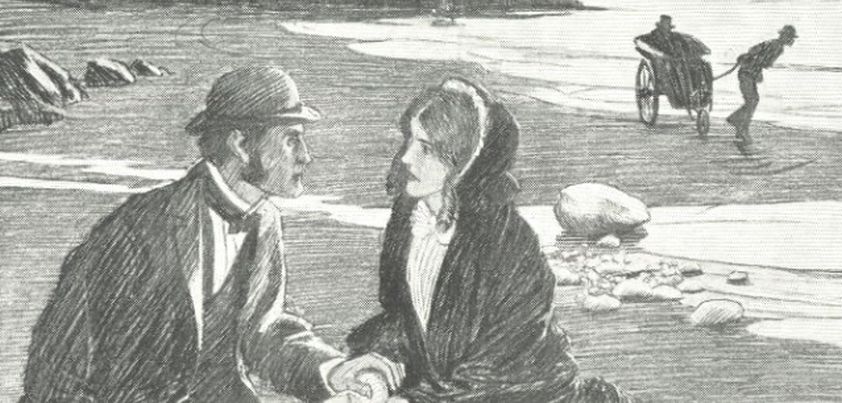 Although the language is that of the mid-Victorian era (occasional archaic vocabulary and long, formal sentences), this witty, detective-style story from Charles Dickens has a climax that would do Agatha Christie proud. The protagonist, a manager in an insurance office, leads us through the rather convoluted tale. With at least one murder and two more on the way, it is not until the end that readers learn that the real “detective” on the killer’s trail is not the protagonist, but one of his intended victims. Themes: first impressions (appearance/body language), deception, murder, justice, love, guilt. More…
Although the language is that of the mid-Victorian era (occasional archaic vocabulary and long, formal sentences), this witty, detective-style story from Charles Dickens has a climax that would do Agatha Christie proud. The protagonist, a manager in an insurance office, leads us through the rather convoluted tale. With at least one murder and two more on the way, it is not until the end that readers learn that the real “detective” on the killer’s trail is not the protagonist, but one of his intended victims. Themes: first impressions (appearance/body language), deception, murder, justice, love, guilt. More…
The Pagan Rabbi
 This story from Cynthia Ozick is about a highly respected Jewish scholar who is driven to suicide as he tries to reconcile the strict tenets of his religion with the philosophical (pagan) concept of immortal “free souls” existing in Nature. This so affects the rabbi’s mind that his suicide note refers to several encounters with a dryad (wood nymph). Some of these are sexual, which he clumsily tries to rationalize with: Scripture does not forbid sodomy with the plants! Themes: Jewish identity; marriage and family; friendship; philosophy (search for meaning in Nature); death; sanity/suicide; (lack of) understanding and forgiveness. More…
This story from Cynthia Ozick is about a highly respected Jewish scholar who is driven to suicide as he tries to reconcile the strict tenets of his religion with the philosophical (pagan) concept of immortal “free souls” existing in Nature. This so affects the rabbi’s mind that his suicide note refers to several encounters with a dryad (wood nymph). Some of these are sexual, which he clumsily tries to rationalize with: Scripture does not forbid sodomy with the plants! Themes: Jewish identity; marriage and family; friendship; philosophy (search for meaning in Nature); death; sanity/suicide; (lack of) understanding and forgiveness. More…
Mrs Plum
 Set in 1960s Johannesburg, this story by Es’kia (Ezekiel) Mphahlele follows Karabo, a nineteen-year-old house-servant working for the enigmatic Mrs Plum. On the surface, Mrs Plum is an enlightened activist who helps Karabo improve herself and campaigns for better treatment for black South Africans. In naming the story Mrs Plum, Mphahlele hints at its major theme: the hypocrisy of many white liberals under apartheid. Deep down Mrs Plum still harbors racist sentiments, cares little for Karabo as a person, and is prone to perversion. Other themes include racism and civil rights, identity, family, personal growth and development, self-awareness and assertiveness. More…
Set in 1960s Johannesburg, this story by Es’kia (Ezekiel) Mphahlele follows Karabo, a nineteen-year-old house-servant working for the enigmatic Mrs Plum. On the surface, Mrs Plum is an enlightened activist who helps Karabo improve herself and campaigns for better treatment for black South Africans. In naming the story Mrs Plum, Mphahlele hints at its major theme: the hypocrisy of many white liberals under apartheid. Deep down Mrs Plum still harbors racist sentiments, cares little for Karabo as a person, and is prone to perversion. Other themes include racism and civil rights, identity, family, personal growth and development, self-awareness and assertiveness. More…
A Simple Heart / Soul
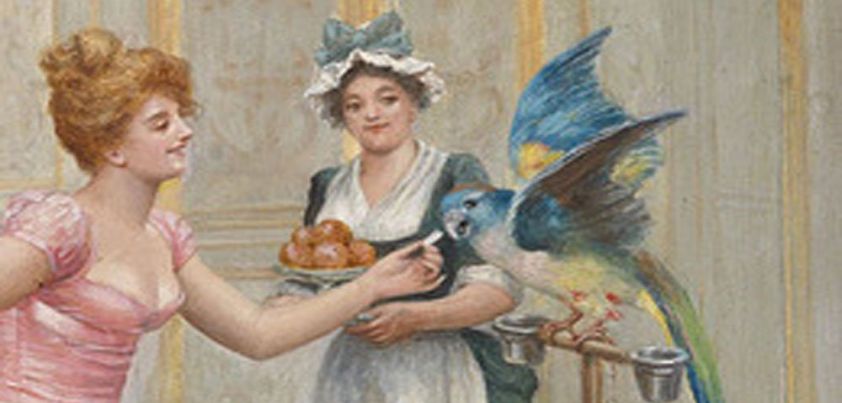 Set in nineteenth century France, this story by Gustav Flaubert portrays the life of an uneducated, simple-minded country girl who lives through fifty years of drudgery as house servant to a “disagreeable” woman who has fallen on hard times. The girl’s story evokes feelings of both admiration and sympathy: Admiration for her loyalty, piety, kindness and failure to give in to despair; Sympathy for her shameless exploitation, history of disappointment and loss, and misery and suffering approaching death. Themes: innocence; duty, faith and virtue; love and compassion; social class; wealth, poverty and exploitation; suffering, loss and death. More…
Set in nineteenth century France, this story by Gustav Flaubert portrays the life of an uneducated, simple-minded country girl who lives through fifty years of drudgery as house servant to a “disagreeable” woman who has fallen on hard times. The girl’s story evokes feelings of both admiration and sympathy: Admiration for her loyalty, piety, kindness and failure to give in to despair; Sympathy for her shameless exploitation, history of disappointment and loss, and misery and suffering approaching death. Themes: innocence; duty, faith and virtue; love and compassion; social class; wealth, poverty and exploitation; suffering, loss and death. More…
Pigeon Feathers
 John Updike’s Pigeon Feathers is a web of conflicts and satire. The central conflict is thirteen-year-old David’s crisis of faith, which he ultimately resolves through an epiphany born out of bloody violence. David’s questioning leads to conflict with the family church minister, who dismisses his concerns by inanely equating Heaven to the “goodness” of Abraham Lincoln. Unresolved conflicts include country vs. city living, and the organic (the land has a soul) vs. chemical (the earth is nothing but chemicals) farming debate between David’s parents. Themes: environmentalism, aging and death, family, isolation, spirituality, science vs. religion, the wonder of nature, faith. More…
John Updike’s Pigeon Feathers is a web of conflicts and satire. The central conflict is thirteen-year-old David’s crisis of faith, which he ultimately resolves through an epiphany born out of bloody violence. David’s questioning leads to conflict with the family church minister, who dismisses his concerns by inanely equating Heaven to the “goodness” of Abraham Lincoln. Unresolved conflicts include country vs. city living, and the organic (the land has a soul) vs. chemical (the earth is nothing but chemicals) farming debate between David’s parents. Themes: environmentalism, aging and death, family, isolation, spirituality, science vs. religion, the wonder of nature, faith. More…
Neighbour Rosicky
 This heart-warming story from Willa Cather exemplifies all that is said to be good about life in rural America. Anton Rosicky followed other impoverished Czech immigrants seeking a better life overseas. Assisted by small acts of kindness along the way, he reaches America where he acquires a modest farm and raises a large, contented family. This is quite a long story with many themes: love, family values, neighborliness, doing what’s right vs. chasing money, city vs. country living, connection, hard work, contentment, reminiscing and (with a grandchild on the way as Anton dies) the cycle of life. More…
This heart-warming story from Willa Cather exemplifies all that is said to be good about life in rural America. Anton Rosicky followed other impoverished Czech immigrants seeking a better life overseas. Assisted by small acts of kindness along the way, he reaches America where he acquires a modest farm and raises a large, contented family. This is quite a long story with many themes: love, family values, neighborliness, doing what’s right vs. chasing money, city vs. country living, connection, hard work, contentment, reminiscing and (with a grandchild on the way as Anton dies) the cycle of life. More…
The Overcoat (The Cloak)
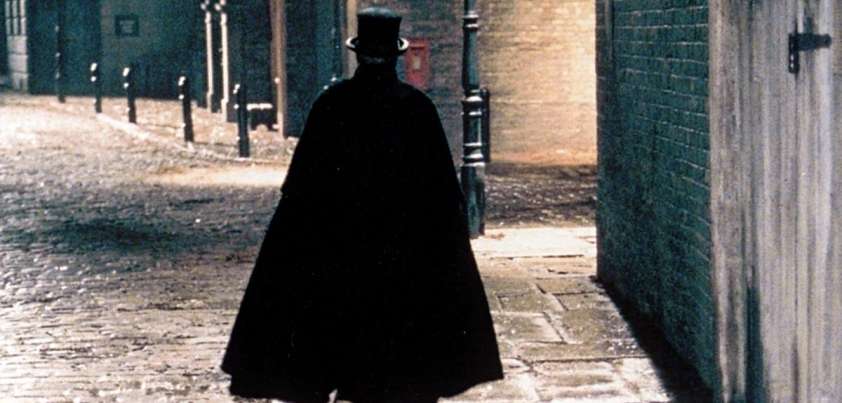 This story by Nikolai Gogol, described by Vladimir Nabokov as the greatest Russian short story ever written, uses pathos and dry humor to get its messages across. The protagonist represents Russia’s working class, eking out a living in a tedious, low-level job. Things improve dramatically when a windfall allows him to buy a new overcoat. Sadly, after a mugger steals the coat, shortcomings in the justice system and failing health contribute to his death. Perhaps metaphorically, his ghost rises up and terrorizes the city in retribution. Themes: alienation, (lack of) connection and compassion, bureaucracy, materialism, social class, the supernatural, revenge. More…
This story by Nikolai Gogol, described by Vladimir Nabokov as the greatest Russian short story ever written, uses pathos and dry humor to get its messages across. The protagonist represents Russia’s working class, eking out a living in a tedious, low-level job. Things improve dramatically when a windfall allows him to buy a new overcoat. Sadly, after a mugger steals the coat, shortcomings in the justice system and failing health contribute to his death. Perhaps metaphorically, his ghost rises up and terrorizes the city in retribution. Themes: alienation, (lack of) connection and compassion, bureaucracy, materialism, social class, the supernatural, revenge. More…
Sorrow-Acre
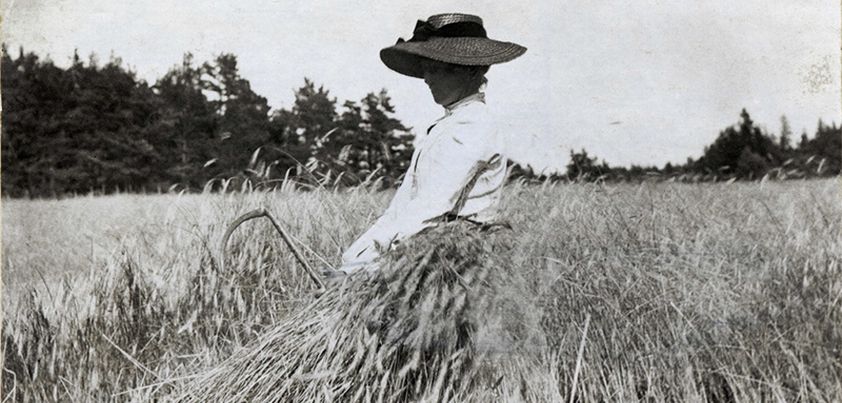 This story by Isak Dinesen (aka Karen Blixen) has an “overall” plot, a “subordinate” plot, and an “incomplete” plot. The overall plot considers how moves towards democracy elsewhere in Europe might affect late eighteenth-century Danish society. The subordinate plot (the tragic story of a mother given a near-impossible task to save her son) illustrates why change is necessary, and the difficulty the ruling class will have in adjusting to it. The incomplete plot (see below) foreshadows a possible affair between the protagonist and his seventeen-year-old love-starved aunt. Themes: culture and tradition, birthright, duty, feudalism vs. democracy, injustice, motherhood, suffering. More…
This story by Isak Dinesen (aka Karen Blixen) has an “overall” plot, a “subordinate” plot, and an “incomplete” plot. The overall plot considers how moves towards democracy elsewhere in Europe might affect late eighteenth-century Danish society. The subordinate plot (the tragic story of a mother given a near-impossible task to save her son) illustrates why change is necessary, and the difficulty the ruling class will have in adjusting to it. The incomplete plot (see below) foreshadows a possible affair between the protagonist and his seventeen-year-old love-starved aunt. Themes: culture and tradition, birthright, duty, feudalism vs. democracy, injustice, motherhood, suffering. More…
The Million Pound Bank Note
 This humorous story from Samuel Clemens (aka Mark Twain) explores two themes related to the power of money. The first is the different attitudes people have towards the rich and the poor. The second, which is particularly relevant today, is the power the rich (influencers) can exert over the decision-making of admirers (followers). Other themes: enduring love (Portia and Henry’s relationship prospers, despite their playful deceptions); honesty (Henry’s intention to pay back his debts); and the peculiarities of British High Society (settling arguments with bets, determining social position through gossip columns, and missing meals if unable to decide seating precedence). More…
This humorous story from Samuel Clemens (aka Mark Twain) explores two themes related to the power of money. The first is the different attitudes people have towards the rich and the poor. The second, which is particularly relevant today, is the power the rich (influencers) can exert over the decision-making of admirers (followers). Other themes: enduring love (Portia and Henry’s relationship prospers, despite their playful deceptions); honesty (Henry’s intention to pay back his debts); and the peculiarities of British High Society (settling arguments with bets, determining social position through gossip columns, and missing meals if unable to decide seating precedence). More…
Barn Burning
 Barn Burning by William Faulkner is a story of how a ten-year-old boy rises above the intimidation and bullying of his embittered father. The father’s simmering anger stems from jealousy and lack of respect, fueled by an exploitative sharecropping system that keeps tenant families like his in perpetual poverty. He seeks retribution through senseless acts of arson (barn burning) against landholders he believes have slighted him. The boy, sensing the immorality of his father’s actions, has the courage to rebel and do something about it. Themes: family, class, alienation, exploitation, pride, anger, revenge, loyalty vs. morality, courage, betrayal. More…
Barn Burning by William Faulkner is a story of how a ten-year-old boy rises above the intimidation and bullying of his embittered father. The father’s simmering anger stems from jealousy and lack of respect, fueled by an exploitative sharecropping system that keeps tenant families like his in perpetual poverty. He seeks retribution through senseless acts of arson (barn burning) against landholders he believes have slighted him. The boy, sensing the immorality of his father’s actions, has the courage to rebel and do something about it. Themes: family, class, alienation, exploitation, pride, anger, revenge, loyalty vs. morality, courage, betrayal. More…
A Girl Like Phyl
 The major themes of this story by Patricia Highsmith are shattered dreams, hypocrisy, betrayal and the fragile nature of identity. A chance meeting with an eighteen-year-old girl at an airport revives bittersweet memories for a successful, seemingly happily married businessman. The girl, who bears a striking resemblance to his long obsessed over ex-girlfriend Phyl, later ends up in his hotel room and tries to seduce him. When he learns the next day that she is Phyl’s daughter and observes Phyl berating her for spending the night in a stranger’s room, his self-esteem and outlook on life are destroyed. More…
The major themes of this story by Patricia Highsmith are shattered dreams, hypocrisy, betrayal and the fragile nature of identity. A chance meeting with an eighteen-year-old girl at an airport revives bittersweet memories for a successful, seemingly happily married businessman. The girl, who bears a striking resemblance to his long obsessed over ex-girlfriend Phyl, later ends up in his hotel room and tries to seduce him. When he learns the next day that she is Phyl’s daughter and observes Phyl berating her for spending the night in a stranger’s room, his self-esteem and outlook on life are destroyed. More…
Camp Cataract
 This story from Jane Bowles examines the toxic relationship between three troubled sisters who share a city apartment. One of them is midway through a ten-week holiday in a Camp Cataract cabin as part of a long-term plan to move out and live independently. When another turns up uninvited, hoping to convince her to cut the holiday short, they arrange to meet for lunch the next day. Both have different recollections of what happens the following morning. Madness intervenes, and only one of them survives the day. Themes: self-analysis, identity, independence, mental illness, spinsterhood, female relationships. More…
This story from Jane Bowles examines the toxic relationship between three troubled sisters who share a city apartment. One of them is midway through a ten-week holiday in a Camp Cataract cabin as part of a long-term plan to move out and live independently. When another turns up uninvited, hoping to convince her to cut the holiday short, they arrange to meet for lunch the next day. Both have different recollections of what happens the following morning. Madness intervenes, and only one of them survives the day. Themes: self-analysis, identity, independence, mental illness, spinsterhood, female relationships. More…
The Gioconda Smile
 Superficially Aldous Huxley’s Gioconda Smile is a straightforward story about a narcissistic womanizer who learns to his cost the meaning of the expression: Hell hath no fury like a woman scorned. On another level, it is a wonderful satire of the lavish, hedonistic lifestyles of upper-middle-class 1920s British society. The protagonist’s apparent lack of conscience may be due to his admitted psychopathy (not only did he not feel sympathy for the poor, the weak, the diseased, and deformed; he actually hated them). This raises the question: did he really deserve his fate? Themes: vanity, philandering, class, passion, murder, rejection, betrayal. More…
Superficially Aldous Huxley’s Gioconda Smile is a straightforward story about a narcissistic womanizer who learns to his cost the meaning of the expression: Hell hath no fury like a woman scorned. On another level, it is a wonderful satire of the lavish, hedonistic lifestyles of upper-middle-class 1920s British society. The protagonist’s apparent lack of conscience may be due to his admitted psychopathy (not only did he not feel sympathy for the poor, the weak, the diseased, and deformed; he actually hated them). This raises the question: did he really deserve his fate? Themes: vanity, philandering, class, passion, murder, rejection, betrayal. More…
The Adventure of the Speckled Band
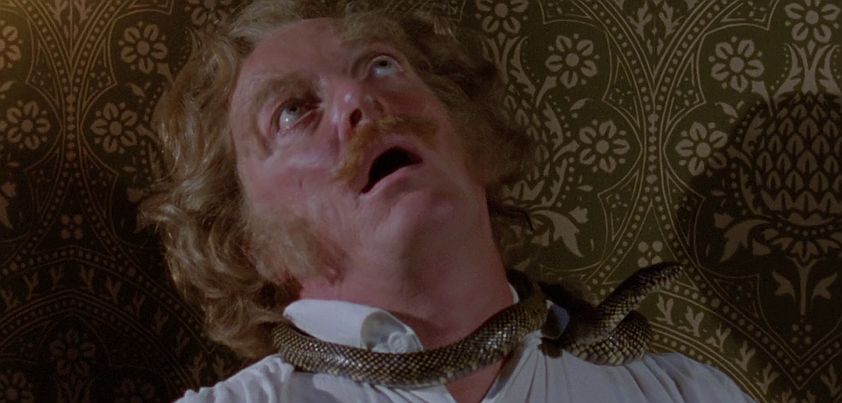 This story, considered by Arthur Conan Doyle to be his best Sherlock Holmes mystery, features one of his most creative (and unlikeliest) murder plots. Thirty-year-old Helen, Holmes’s client, is a victim of Victorian attitudes towards women. Fearing for their future, her dead mother had decided that she and twin sister Julia would not receive their inheritances until they married. Their violent stepfather, who manages the money, will become destitute should either of them wed. After announcing her engagement, Julia dies under mysterious circumstances. Helen fears that she will be next. Themes: decay, isolation, fear, murder, class, greed, hasty judgement, justice. More…
This story, considered by Arthur Conan Doyle to be his best Sherlock Holmes mystery, features one of his most creative (and unlikeliest) murder plots. Thirty-year-old Helen, Holmes’s client, is a victim of Victorian attitudes towards women. Fearing for their future, her dead mother had decided that she and twin sister Julia would not receive their inheritances until they married. Their violent stepfather, who manages the money, will become destitute should either of them wed. After announcing her engagement, Julia dies under mysterious circumstances. Helen fears that she will be next. Themes: decay, isolation, fear, murder, class, greed, hasty judgement, justice. More…
Rappaccini’s Daughter
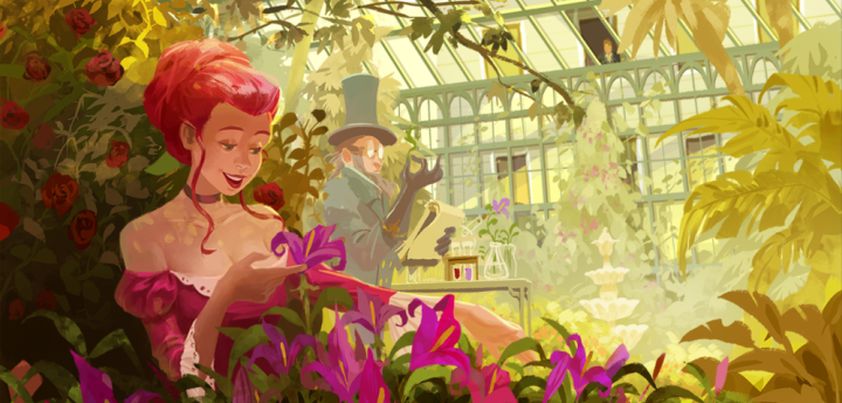 This story from Nathaniel Hawthorne takes the “mad scientist” motif to a new level. Renowned physician Rappicini is fascinated with the curative power of deadly plants. An experiment that makes his young daughter immune to their poison comes at a terrible price: her skin and breath become toxic to others. As the poor girl grows into womanhood, the twisted doctor decides to make a potential partner immune to her poison. Unfortunately for all, a scientific rival plants a different kind of poison in the man’s heart and hands. Themes: science vs. morality, innocence, nature, oppression, isolation, envy, love, betrayal.
This story from Nathaniel Hawthorne takes the “mad scientist” motif to a new level. Renowned physician Rappicini is fascinated with the curative power of deadly plants. An experiment that makes his young daughter immune to their poison comes at a terrible price: her skin and breath become toxic to others. As the poor girl grows into womanhood, the twisted doctor decides to make a potential partner immune to her poison. Unfortunately for all, a scientific rival plants a different kind of poison in the man’s heart and hands. Themes: science vs. morality, innocence, nature, oppression, isolation, envy, love, betrayal.
More…
In the Tunnel
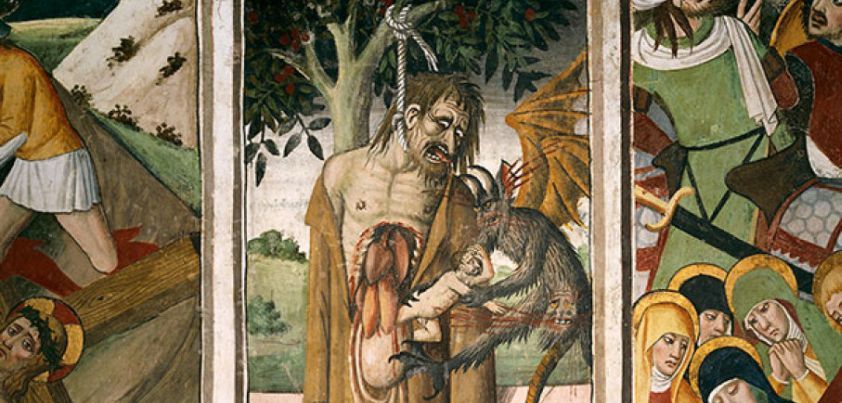 This story from Mavis Gallant deals with the experiences of a Canadian college student “banished” to Europe by her strict father to end an affair with a married professor. While there, she falls prey to a troubled older man who appears practiced in picking up vulnerable young woman and discarding them immediately something happens that is not to his liking. Their time together, living in his “tunnel-like” room in the garden of an eccentric, thoroughly dislikeable British couple, is not what she expected. Themes: amoureuse mal placé (misplaced love), independence, exploitation, betrayal, cruelty, politics, aging, identity.
This story from Mavis Gallant deals with the experiences of a Canadian college student “banished” to Europe by her strict father to end an affair with a married professor. While there, she falls prey to a troubled older man who appears practiced in picking up vulnerable young woman and discarding them immediately something happens that is not to his liking. Their time together, living in his “tunnel-like” room in the garden of an eccentric, thoroughly dislikeable British couple, is not what she expected. Themes: amoureuse mal placé (misplaced love), independence, exploitation, betrayal, cruelty, politics, aging, identity.
More…
Big Blonde
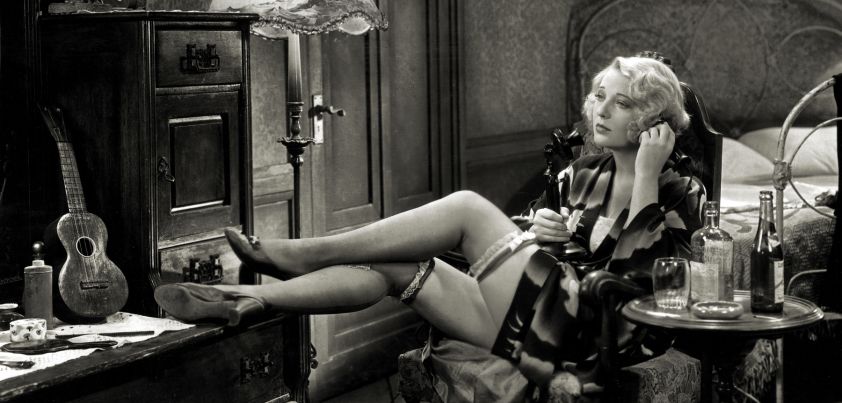 This rather depressing story from Dorothy Parker exposes the different socioeconomic standing and sexual standards applicable to men and women in 1920s America. The protagonist (Hazel) falls from being a popular plus-size model to a depressed middle-aged alcoholic. The cause of her decline lies in extreme moods that sour relationships with her husband and the other hard-drinking men in her life. Forced into a demeaning series of casual affairs with married men who pay her keep in expectation of sexual services, she sees only one pathway to lasting peace. Themes: body image, vulnerability, sexual exploitation, loss of identity/self-esteem, depression, alcoholism. More…
This rather depressing story from Dorothy Parker exposes the different socioeconomic standing and sexual standards applicable to men and women in 1920s America. The protagonist (Hazel) falls from being a popular plus-size model to a depressed middle-aged alcoholic. The cause of her decline lies in extreme moods that sour relationships with her husband and the other hard-drinking men in her life. Forced into a demeaning series of casual affairs with married men who pay her keep in expectation of sexual services, she sees only one pathway to lasting peace. Themes: body image, vulnerability, sexual exploitation, loss of identity/self-esteem, depression, alcoholism. More…
Amnesty
 In this story by Octavia Butler, Earth’s economy collapses following the arrival of an advanced alien race that settles in the world’s deserts. A reluctant co-existence develops when it becomes clear that the aliens cannot be destroyed. The protagonist, kidnapped by the aliens at age eleven and subjected to cruel experiments, is now an Interpreter for one of their “communities”. Her current mission: to “calm” and prepare six recruits for well-paid positions translating for other communities. Although they need the job, the applicants are full of anger and hostility towards the aliens. Themes: fear, ignorance, social experimentation, torture, hatred, détente. More…
In this story by Octavia Butler, Earth’s economy collapses following the arrival of an advanced alien race that settles in the world’s deserts. A reluctant co-existence develops when it becomes clear that the aliens cannot be destroyed. The protagonist, kidnapped by the aliens at age eleven and subjected to cruel experiments, is now an Interpreter for one of their “communities”. Her current mission: to “calm” and prepare six recruits for well-paid positions translating for other communities. Although they need the job, the applicants are full of anger and hostility towards the aliens. Themes: fear, ignorance, social experimentation, torture, hatred, détente. More…
Wandering Willie’s Tale
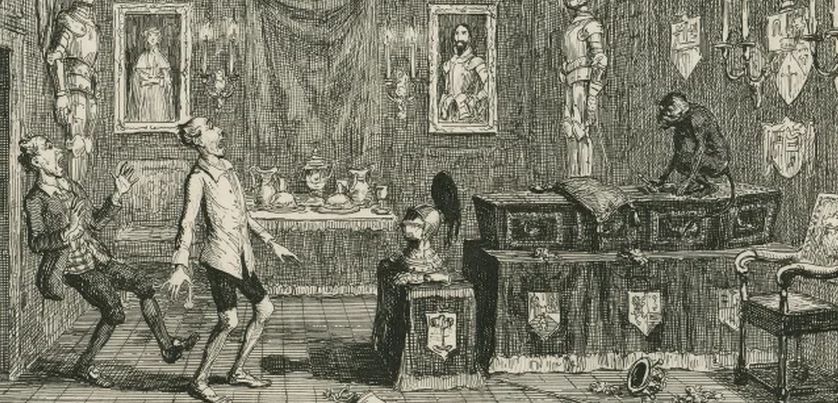 Warning, this story by Sir Walter Scott can be hard going for inexperienced readers due to its use of original dialect and obsolete vocabulary. When a violent Scottish Lord presses a tenant for long outstanding rent, the man borrows the money and returns to pay it. The Lord dies as he hands it over, and the money disappears during the commotion. The Lord’s son doesn’t believe the rent was paid, and demands payment. A mysterious stranger helps the devastated tenant by accompanying him to hell to collect a receipt. Themes: changing times, the supernatural, beware who you travel with. More…
Warning, this story by Sir Walter Scott can be hard going for inexperienced readers due to its use of original dialect and obsolete vocabulary. When a violent Scottish Lord presses a tenant for long outstanding rent, the man borrows the money and returns to pay it. The Lord dies as he hands it over, and the money disappears during the commotion. The Lord’s son doesn’t believe the rent was paid, and demands payment. A mysterious stranger helps the devastated tenant by accompanying him to hell to collect a receipt. Themes: changing times, the supernatural, beware who you travel with. More…